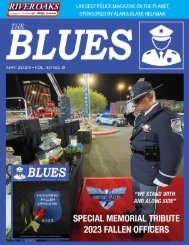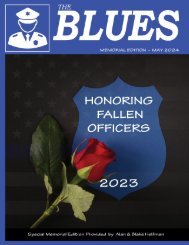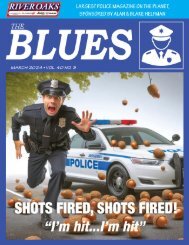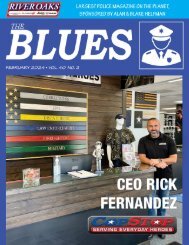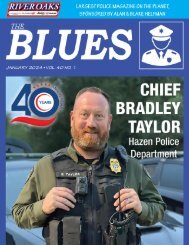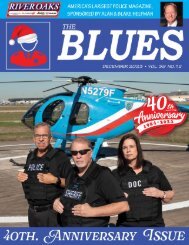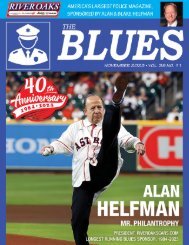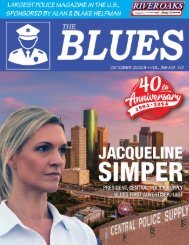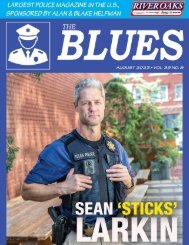OCT 2021 Blues Vol 37 No. 10.1
OCT 2021 Blues Vol 37 No. 10.1 WE REMEMBER: We say good bye to a true hero, Senior Police Officer William “Bill” Jeffrey. FEATURE STORIES: • Biden Try’s To Eliminate Border Mounted Officers • Washington Try’s To Shift Focus From Drone Strike To Baseless Whipping Story At The Border • Who Wants To Be A Cop Part 6 DEPARTMENTS • Publisher’s Thoughts Part I. • Editor’s Thoughts • Your Thoughts • News Around the State • News Around the Country • Products & Services -Alternative Ballistics • Honoring our Fallen Heroes • Warstories • Aftermath • Open Road-Mustang Mach E Goes to Patrol • Healing Our Heroes • Daryl’s Deliberations • HPOU-From the President, Douglas Griffith • Light Bulb Award • Running 4 Heroes • Blue Mental Health with Tina Jaeckle • Off Duty with Rusty Barron • Parting Shots • Now Hiring - L.E.O. Positions Open in Texas • Last Page -Take Out the Trash
OCT 2021 Blues Vol 37 No. 10.1
WE REMEMBER: We say good bye to a true hero, Senior Police Officer William “Bill” Jeffrey.
FEATURE STORIES:
• Biden Try’s To Eliminate Border Mounted Officers
• Washington Try’s To Shift Focus From Drone Strike
To Baseless Whipping Story At The Border
• Who Wants To Be A Cop Part 6
DEPARTMENTS
• Publisher’s Thoughts Part I.
• Editor’s Thoughts
• Your Thoughts
• News Around the State
• News Around the Country
• Products & Services -Alternative Ballistics
• Honoring our Fallen Heroes
• Warstories
• Aftermath
• Open Road-Mustang Mach E Goes to Patrol
• Healing Our Heroes
• Daryl’s Deliberations
• HPOU-From the President, Douglas Griffith
• Light Bulb Award
• Running 4 Heroes
• Blue Mental Health with Tina Jaeckle
• Off Duty with Rusty Barron
• Parting Shots
• Now Hiring - L.E.O. Positions Open in Texas
• Last Page -Take Out the Trash
You also want an ePaper? Increase the reach of your titles
YUMPU automatically turns print PDFs into web optimized ePapers that Google loves.
Be Your Own Advocate.<br />
Recently, John Salerno and I<br />
had the pleasure of interviewing<br />
a subject matter expert in the<br />
area of post-traumatic stress.<br />
The organization she is with<br />
does a lot of research and connects<br />
grassroots organizations<br />
together to fill the gaps where<br />
treatment for stress, post-traumatic<br />
stress and mental health<br />
might not be available for first<br />
responders. During our discussions<br />
we talked about the gaps<br />
that still exist for law enforcement<br />
officers; The size of the<br />
agency, the willingness of the<br />
command staff to provide support<br />
to its officers, and budget.<br />
We all agreed on one major<br />
point. It is still up to us to ask<br />
for the help when we realize we<br />
need it or if another officer or<br />
supervisor approaches us. We<br />
must rid our vocabulary of the<br />
word “FINE” and bust through the<br />
stigma. There is a huge advantage<br />
here that sometimes gets<br />
overlooked. The reality is that<br />
you are not trapped by your<br />
command staff or organization.<br />
You can go outside your agency<br />
for assistance.<br />
Over the years, the “control”<br />
that our agencies exercised in<br />
the area of mental health and<br />
wellness or the outright “suck<br />
it up” mentality influenced and<br />
bolstered the stigma associated<br />
with asking for help for stuff<br />
going on in our heads. <strong>No</strong> one<br />
wanted to risk being assigned to<br />
“the rubber gun squad,” or have<br />
other officers question our fitness<br />
for duty. The solution - say<br />
nothing, ever. As the suicide rate<br />
increased, the need to provide<br />
assistance of some kind was addressed<br />
by some agencies. Those<br />
agencies who took on the battle<br />
to help officers with their mental<br />
health sort of figured it out.<br />
I say sort of because the stigma<br />
continued to lurk in the shadows.<br />
Officers were not going to ask<br />
to “go to the department shrink”<br />
or the in-house employee assistance<br />
program. Why? Confidentiality.<br />
Their “stuff” would be<br />
known throughout the department.<br />
Officers were left with a<br />
no-win, no-way-out solution.<br />
Again, say nothing, ever.<br />
Over the years as some departments<br />
saw command staff retirements,<br />
it seemed to usher in<br />
a new, younger, and more open<br />
personnel. The discussion of a<br />
budget for mental health and<br />
the creation of a Mental Health<br />
Liaison officer began. However,<br />
most officers that we have spoken<br />
to and departments we have<br />
visited have that liaison officer in<br />
an office right next to the Chief<br />
or Assistant Chief. So, while the<br />
open-door policy to get help<br />
for mental health was there, we<br />
were told that officers were not<br />
going to go to that office simply<br />
because of the proximity to the<br />
command staff where a conversation<br />
might be overheard or<br />
where questions might linger<br />
when the officer walked out of<br />
the liaison’s office. The solution,<br />
say nothing ever.<br />
While these changes were<br />
occurring, the grassroots programs<br />
started. The realization<br />
that while the departments were<br />
trying, it was easier for an officer<br />
to go outside his/ her agency<br />
for assistance. The grassroots<br />
program provided confidentiality,<br />
which meant that the officer<br />
could get the help without the<br />
fear of reprisals or questions. In<br />
fact, many of the officers I met<br />
while I traveled to speak at conferences<br />
confided in me that they<br />
went outside their agency and<br />
were on the path to healing, all<br />
the while successfully maintaining<br />
their jobs and family life.<br />
As some departments continued<br />
their awareness journey to<br />
aid their officers, the grassroots<br />
programs continued to grow.<br />
Some of them with the ability<br />
to offset department budgets<br />
which meant the departments<br />
could rely on them to help their<br />
officers. The departments were<br />
on a “need to know” information<br />
stream. Only if an officer stated<br />
they were going to hurt themselves<br />
or someone else was the<br />
department informed. Confidentiality,<br />
anonymity, and a comfort<br />
level were provided to the officer.<br />
As a result, we started to see<br />
dents in the stigma.<br />
When departments created<br />
Peer Support programs, those<br />
that were successful saw a<br />
decrease in suicides and an<br />
increase in positive outcomes<br />
for the officers. Supported from<br />
the top, with an emphasis on<br />
ZERO reprisals by the department,<br />
officers could get the help<br />
they asked for. The result. The<br />
dents in the stigma grew larger.<br />
As the command staff’s awareness<br />
grew about the positive<br />
outcomes for their officers, the<br />
indicators showed that the department<br />
functioned better. And<br />
a good functioning department<br />
means a healthy department.<br />
Are these “successful” departments<br />
the outliers? Maybe.<br />
The hope is that the grassroots<br />
programs and the departments<br />
work together to continue to put<br />
dents in the stigma, ultimately<br />
smashing it completely one day.<br />
What we still do know for sure<br />
is you are your best advocate. As<br />
Help us reach our goal<br />
of 100,000 subscribers.<br />
CLICK BELOW for your<br />
FREE SUBSCRIPTION.<br />
Please share with<br />
all your friends and<br />
co-workers.<br />
hard as it may be, you must be<br />
the one to reach out and ask for<br />
help. The grassroots programs<br />
like A Badge of Honor are here<br />
to assist at every level. We allow<br />
you to be in control of your<br />
mental health journey, leaving<br />
behind the one thing that still<br />
hampers some requests from<br />
within the department…STIGMA.<br />
So, find the courage to be your<br />
own advocate. And remember,<br />
your journey may help to save<br />
another brother, sister, and/or<br />
BLUE family. You are not alone.<br />
Samantha Horwitz is a regular<br />
contributor to The <strong>Blues</strong> Police<br />
Magazine. She is a 9/11 first responder,<br />
former United States<br />
Secret Service Agent, speaker,<br />
and author. She and her business<br />
partner, ret. NYPD detective<br />
John Salerno created A Badge of<br />
Honor, a 501(c)(3), post-traumatic<br />
stress and suicide prevention<br />
program for first responders.<br />
John and Sam host MAD (Making<br />
a Difference) Radio each Wednesday<br />
7pm central live on FB @<br />
Makingadifferencetx. For more<br />
about Sam and the wellness and<br />
resiliency workshops for first<br />
responders, visit ABadgeofHonor.<br />
com.<br />
TO LETHAL FORCE<br />
INSTANTLY CONVERTS SERVICE WEAPON TO LESS LETHAL PLATFORM<br />
EXTREMELY ACCURATE UP TO 32 FEET & REGISTERS AIS RANGE LEVEL 2<br />
DESIGNED TO INCAPACITATE A NON-COMPLIANT SUSPECT & SAFELY AFFECT AN ARREST<br />
ONCE THE UNIT IS DEPLOYED, SERVICE WEAPON INSTANTLY RETURNS TO LETHAL FORCE CAPABILITY<br />
ENDORSED BY LEADERS AND PROFESSIONALS FROM THE LE COMMUNITY<br />
619.326.4411<br />
INFO@ALTERNATIVEBALLLISTICS.COM<br />
WWW.ALTERNATIVEBALLISTICS.COM<br />
CLICK OR SCAN HERE<br />
96 The BLUES POLICE MAGAZINE The BLUES POLICE MAGAZINE 97







